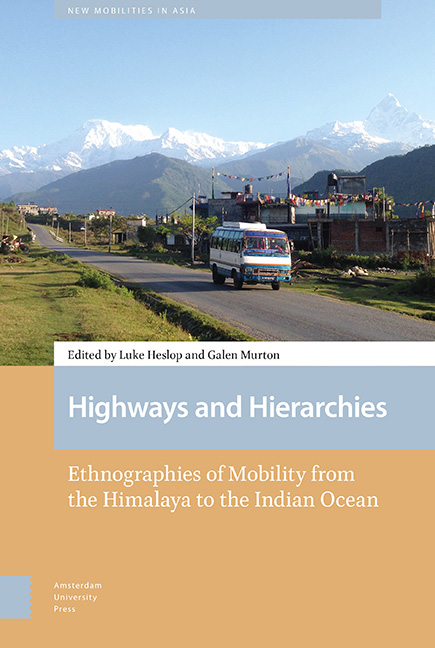Book contents
- Frontmatter
- Contents
- List of figures
- Acknowledgements
- Preface: Thinking with roads
- 1 Why highways remake hierarchies
- 2 Stuck on the side of the road: Mobility, marginality, and neoliberal governmentality in Nepal
- 3 A road to the ‘hidden place’: Road building and state formation in Medog, Tibet
- 4 Dhabas, highways, and exclusion
- 5 The edge of Kaladan: A ‘spectacular’ road through ‘nowhere’ on the India-Myanmar borderlands
- 6 The making of a ‘new Dubai’: Infrastructural rhetoric and development in Pakistan
- 7 Encountering Chinese development in the Maldives: Gifts, hospitality, and rumours
- 8 Roads and the politics of thought: Climate in India, democracy in Nepal
- Authors notes
- Index
1 - Why highways remake hierarchies
Published online by Cambridge University Press: 13 November 2021
- Frontmatter
- Contents
- List of figures
- Acknowledgements
- Preface: Thinking with roads
- 1 Why highways remake hierarchies
- 2 Stuck on the side of the road: Mobility, marginality, and neoliberal governmentality in Nepal
- 3 A road to the ‘hidden place’: Road building and state formation in Medog, Tibet
- 4 Dhabas, highways, and exclusion
- 5 The edge of Kaladan: A ‘spectacular’ road through ‘nowhere’ on the India-Myanmar borderlands
- 6 The making of a ‘new Dubai’: Infrastructural rhetoric and development in Pakistan
- 7 Encountering Chinese development in the Maldives: Gifts, hospitality, and rumours
- 8 Roads and the politics of thought: Climate in India, democracy in Nepal
- Authors notes
- Index
Summary
Abstract
This chapter lays out the volume's documentation of many of the uneven – and unexpected – experiences of mobility transformation as it unfolds as a developmental imperative across vast and complex landscapes of South Asia. Whether journeys become shorter, faster, more treacherous, cheaper, or more costly, questions about ownership, management, access to ‘public goods’, responsibility, and other critical concerns consistently take new shape when expressed through the coming of a new road or transportation network. We posit that roads are fragile political achievements. In response to the sweeping state promises about new mobilities and modernization that highways are purported to deliver, the stories comprising this volume, and outlined in this chapter, speak from other perspectives, such as how political opportunity is routinely met with a measure of public scepticism and at times efficacious protest.
Keywords: South Asia, roads, hierarchy, economic transformation, geopolitics
Introduction
There is an old joke told in various configurations throughout South Asia that goes like this:
On a diplomatic mission to the US, a cabinet minister from (insert whichever South Asian country you like here) has some issue with a hotel booking and is offered hospitality at the home of his American political counterpart. In the evening they drink whisky at the American's home and look out over the city. ‘What a beautiful home you have,’ comments the guest. ‘How did you afford such a place on a public servant's salary?’
The American politician points towards a bridge in the near distance and says, ‘You see that bridge?’ His guest nods. ‘Well, you are looking at 1% of the deal.’ Years later the opportunity arises for the cabinet minister to return the hospitality and host the American. In the evening, over more whisky, the American comments on the palatial home of his host and returns the question put to him years before: ‘How did you afford such a place on a public servant's salary?’ At this point, the politician invites the American to look out over the cityscape and observe the bridge across the river. ‘You see that bridge?,’ the politician asks. The American strains his eyes in the dark and says, ‘No, I can't see anything.’
- Type
- Chapter
- Information
- Highways and HierarchiesEthnographies of Mobility from the Himalaya to the Indian Ocean, pp. 21 - 38Publisher: Amsterdam University PressPrint publication year: 2021

